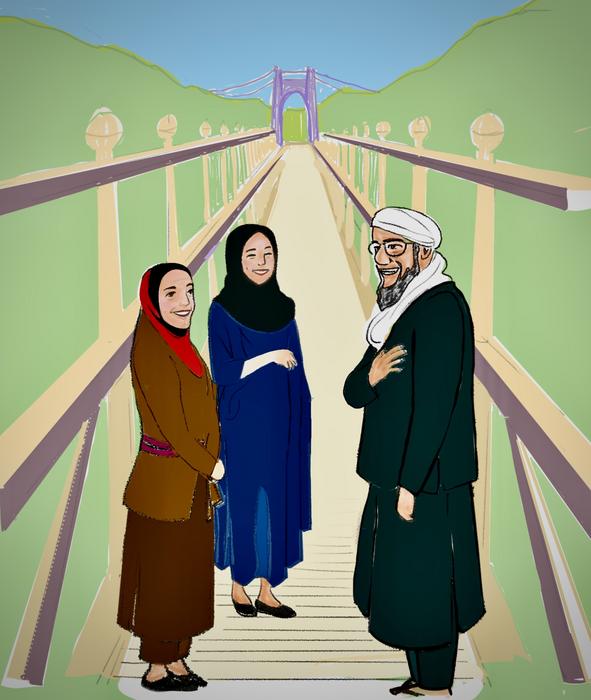Kyoto, Japan — Prejudice and fear have always been at the core of intergroup hostilities.

Credit: KyotoU/Tobiyama/Sofia Sohab
Kyoto, Japan — Prejudice and fear have always been at the core of intergroup hostilities.
While intergroup interaction is a prerequisite for initiating peace and stability at the junction of clashing interests, values, and cultures, the risk of further escalation precisely from direct interactions cannot be ruled out. In particular, a shortage of impartial, nonpartisan personnel to properly manage an electronic contact — or E-contact — session may cause the process to backfire and become destabilized.
Now, a research team including Kyoto University has shown that interactive AI programs may help reduce prejudice and anxiety among historically divided ethnic groups in Afghanistan during online interactions.
“Compared to the control group, participants in the AI intervention group showed more engagement in our study and significantly less prejudice and anxiety toward other ethnic groups,” says Sofia Sahab of KyotoU’s Graduate School of Informatics.
In collaboration with Nagoya University, Nagoya Institute of Technology, and Hokkaido University, Sahab’s team has tested the effectiveness of using a CAI — or conversational AI — on the discussion platform D-Agree to facilitate unbiased and constructive conversations. The program ensures participants a safe, private space to talk freely, a setting that is commonly taken for granted in war-free countries.
“Our over-decade-long work on AI agent-based consensus-building support has empirically demonstrated AI agents’ applicability in de-escalating confrontational situations,” remarks co-author Takayuki Ito, also of the informatics school.
Sahab’s team applied a randomized controlled experiment to determine the causal effects of conversational AI facilitation in online discussions in reducing prejudice and anxiety.
Participants from three ethnic backgrounds were divided into two groups — an AI group and a non-AI control group — to gauge the effects. As expected, the former expressed more empathy toward outside groups than participants in the control group.
“The neutral AI agents aim to reduce risks by coordinating guided conversations as naturally as possible. By providing fair and cost-effective strategies to encourage positive interactions, we can promote lasting harmony among diverse ethnic groups,” adds Sahab.
In the long term, the researchers are considering the potential for AI intervention beyond border conflicts to promote positive social change.
“AI may have come at a pivotal time to aid humanity in enhancing social sustainability with CAI-mediated human interactions,” reflects Sahab.
###
The paper “E-contact Facilitated by Conversational Agents Reduces Interethnic Prejudice and Anxiety in Afghanistan” appeared on 21 March 2024 in Communications Psychology, with doi: 10.1038/s44271-024-00070-z
About Kyoto University
Kyoto University is one of Japan and Asia’s premier research institutions, founded in 1897 and responsible for producing numerous Nobel laureates and winners of other prestigious international prizes. A broad curriculum across the arts and sciences at undergraduate and graduate levels complements several research centers, facilities, and offices around Japan and the world. For more information, please see:
Journal
Communications Psychology
Method of Research
Experimental study
Subject of Research
People
Article Title
E-contact Facilitated by Conversational Agents Reduces Interethnic Prejudice and Anxiety in Afghanistan
Article Publication Date
21-Mar-2024
COI Statement
The authors declare the following competing interests: T.I. served as the Principal Investigator (PI) for the development of the online discussion platform utilized in this research, part of the “Innovating Agent-based Large- scale Consensus Support System” project. This project, supported by the Japan Science and Technology Agency (JST) under the CREST program (Grant No. JPMJCR15EI), received funding from October 2015 to March 2021. The intellectual property (IP) rights of the online platform are jointly owned by Nagoya Institute of Technology and Kyoto University, both national research universities in Japan, and all associated activities within the university are focused on nonprofit research and development. T.I. is also one of the inventors for certain aspects of the technology, for which a United States patent application has been filed (application no: PCT/JP2019/ 031183, Publication no: US 2021/0319187 A1). All other authors have no competing interests to declare.



